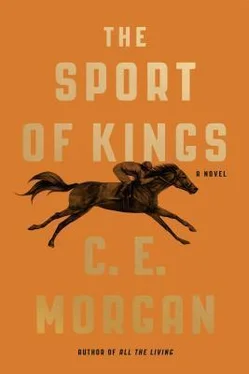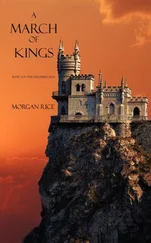“Like the men who cleared our fields when I was younger.”
“Yes, exactly,” said John Henry, “but I intended … Well, the story of the South is long. I sometimes think the Yankees hate us so much because the richness of our story frankly belittles theirs. The original nation is more alive here than it is in the North, and the Northerner resents that. We still know the land, we still know how to treat a woman, we still know the names of all our forefathers. Family actually means something here. Anyway, I was going to tell you a story about your grandfather’s activities in the county, but perhaps I’d better not. Let me just say that there are … artifacts in the house I pray your mother never stumbles upon. I fear she would never recover. I mean only — to return to the original point — that the poor white serves a useful purpose from time to time. The Klan is comprised largely of these country types, almost unfathomably stupid and passionate. This is the sort of man who would kill a Catholic but couldn’t define one. And yet, justice … Henry, it may seem a strange thing for a lawyer to say, but the courts can’t be relied upon to mete out justice in all cases. Abstraction can paralyze. Trust me when I say I know this better than most. I’ve seen the failure a thousand times over. The Klan and their ilk, for all their rabble-rousing, often have a keen sense of right and wrong undiluted by relativism, and they can carry out justice with alacrity. Rough justice, yes, but justice. I don’t wish to glorify the Klan — they’re fools — but … as your grandfather used to say, ‘Manners are morals. And a gentleman always minds his manners … until he can no longer afford to.’ That’s when the Klan comes in handy. They’re more discreet these days than they used to be.”
“Okay,” said Henry. But then, with an expression like petulance or confusion, he placed his chin in his palm and leaned forward and frowned.
John Henry watched his son through narrowing eyes. “Well, I’ve been speaking a good while. You came in to speak with me.”
“I don’t know…”
“Don’t be indirect, Henry.”
“Well,” said Henry innocently, “I guess I … Well, I just don’t really like Filip.”
John Henry blinked a few times, drawing his mind round to this tangent. He cleared his throat. “When you were a child, he was my biting dog. It was only natural that you would feel a certain antipathy toward him. But your insolence was a sign of high spirit, and I wasn’t unappreciative of that fact.”
Henry breathed once very deep, felt his heartbeat in his jaw, looked up into the face of his father. “I don’t trust him.”
There was a twitch of the lip. “Deservedly so. One ought not to entirely trust a drunkar—”
“I heard people talking.”
Into the warm tenor of their talk, a cool wind snaked. John Henry shifted almost imperceptibly, his chin lowering a fraction of an inch. “And what precisely was the nature of this talk you heard?”
“It was probably nothing.”
“Don’t equivocate, Henry.”
Henry’s brow furrowed. “I don’t know—”
“Henry!”
“I think it was about Mother.”
John Henry sat back. “What do you mean?”
“They were talking about someone touching Mother. Maybe Filip.”
The silence in the room was total.
Into its vast expanse Henry said, “I’m not even sure what they meant.”
His father laid his tumbler aside and sat up straight. “Who is they?”
“I don’t know; they were around a corner. Well, I think it was Filip and Maryleen talking? It was a while ago. I’m not sure. But Mother’s so clumsy without her hearing, maybe he was catching her as she fell. I’ve done that myself.”
“Have you spoken to your mother about this?”
“No, should I have?”
The response was a curt “Your five minutes are up.”
“Oh,” he said. “Yes, sir.” Henry was instantly on his feet, standing over his father, who was now reaching down for his shoes. His heart was hammering in his chest, but he felt suddenly unable to step back to open the door. With his father’s head downturned, Henry had a clear view of his thinning crown. In a strange gesture, Henry reached up and touched his own thick hair gingerly. Then, as if the motion had caught his eye, John Henry looked up at his son, who stood there with his hand to a tendril of his hair in what was a strangely winsome — even girlish — manner, looking perplexed and unsure. John Henry’s face was blasting furnace red. He rose up from his seat on the davenport with a suddenness that almost unbalanced him, so he swayed for a moment.
“Henry,” his father said, but then absolutely nothing followed on the name, so they simply looked at each other, and on Henry’s face plain fear appeared. Suddenly and surely with a force that alarmed him, he wanted to retract every word that had been spoken and rip up the court record, but he heard himself saying simply, “Good night, Father.” Then he walked out of the room, feeling as though an enormous, age-old wheel had been set creaking into motion. He moved slowly through the lower halls of the house to the back steps and then climbed woodenly to the second floor. He didn’t know where his mother was and, suddenly, belatedly, was enveloped by a supreme panic, certain that his father was going to kill her. That fear was immediately allayed when he felt the reverberations of the front door slamming, and then, just moments later, the sound of the sedan prowled down the icy lane like a big black cat.
The next morning, Filip did not show up for work at the Forge house, nor did he appear any day thereafter, and the code on the white, silencing streets of Paris was that the man had simply left town.
* * *
And why not? After all, sometimes black men simply left a small, Southern town. Especially when the snow was falling so finely, and there were elderly relatives to visit in Cincinnati and Detroit and trees to trim down in Jackson, Birmingham, and Atlanta. Sometimes a man just went away for the holidays, and then he stayed. Stranger things have happened. Who can say?
Case in point: sometimes a man didn’t even have to leave town to disappear, he just went to the opera like Will Porter, who shot a man in honest self-defense but was ripped from a Kentucky jail, carried high on shoulders like an athlete dying young, down the roiling streets to the opera house. They charged a penny admission and strung him up high over the stage, and the strangling sounds were lost in the blaze of pistol fire from the orchestra seats, and good shots all.
Or a man headed down to the court of public opinion, like C. J. Miller after he allegedly raped and murdered two little girls he’d never seen in a county he’d never been to before. Poor, pathetic killer, half-mad with guilt, they dragged him down to the open-air court, and there were five thousand jurors that day, and all thumbs went down as Mr. Miller, he went up.
Others just burned to leave — like Richard Coleman, a hand on a farm when he rode the black train to Covington for supposed rape and murder. Upon his holiday return, ten thousand good souls were waiting, who bound him to a pole and stoked a creeping fire. All the little children brought kindling and bits of twig and laid them on the hearth of his life and roasted him good and slow. And when the smoke cleared, well, you must forgive the rush for the bones — this was a Kentucky delicacy.
No, this was the 1950s and Kentucky had stopped hanging its black laundry, or so they say. Surely Filip Dunbar wasn’t what his mother used to call the Christmas babies, the ones killed at Christmas, his mother born out of the foul pussy of slavery on a Jessamine County farm, where horses now run. Until she died in 1940, she lit candles during Advent for all those who had perished, and even then the count was quietly rising.
Читать дальше
Конец ознакомительного отрывка
Купить книгу












